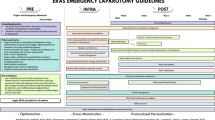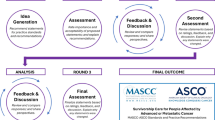Abstract
Background
Healthcare policies have focused on centralizing care to high-volume centers in an effort to optimize patient outcomes; however, little is known about patients’ and caregivers’ considerations and selection process when selecting hospitals for care. We aim to explore how patients and caregivers select hospitals for complex cancer care and to develop a taxonomy for their selection considerations.
Methods
This was a qualitative study in which data were gathered from in-depth interviews conducted from March to November 2019 among patients with hepatopancreatobiliary cancers who were scheduled to undergo a pancreatectomy (n = 20) at a metropolitan, urban regional, or suburban medical center and their caregivers (n = 10).
Results
The interviews revealed six broad domains that characterized hospital selection considerations: hospital factors, team characteristics, travel distance to hospital, referral or recommendation, continuity of care, and insurance considerations. The identified domains were similar between participants seen at the metropolitan center and urban/suburban medical centers, with the following exceptions: participants receiving care specifically at the metropolitan center noted operative volume and access to specific services such as clinical trials in their hospital selection; participants receiving care at urban/suburban centers noted health insurance considerations and having access to existing medical records in their hospital selection.
Conclusions
This study delineates the many considerations of patients and caregivers when selecting hospitals for complex cancer care. These identified domains should be incorporated into the development and implementation of centralization policies to help increase patient access to high-quality cancer care that is consistent with their priorities and needs.
Similar content being viewed by others
References
Commission on Cancer: Cancer Program Accreditation: Categories of Approval. 2016. http://www.facs.org/cancer/coc/categories.html. 2016.
Damman OC, Hendriks M, Rademakers J, et al. How do healthcare consumers process and evaluate comparative healthcare information? A qualitative study using cognitive interviews. BMC Public Health. 2009;9:423.
Proposed Decision Memo for Bariatric Surgery for the Treatment of Morbid Obesity - Facility Certification Requirement (CAG-00250R3) 2013. https://www.cms.gov/medicare-coverage-database/details/nca-proposed-decision-memo.aspx?NCAId=266. Accessed 10 Jul 2018.
Fong ZV, Chang DC, Hur C, et al. Variation in long-term oncologic outcomes by type of cancer center accreditation: an analysis of a SEER-Medicare population with pancreatic cancer. Am J Surg. 2020;220(1):29–34.
Chau Z, West JK, Zhou Z, et al. Rankings versus reality in pancreatic cancer surgery: a real-world comparison. HPB (Oxford). 2014;16:528–33.
Hillner BE, Smith TJ, Desch CE. Hospital and physician volume or specialization and outcomes in cancer treatment: importance in quality of cancer care. J Clin Oncol. 2000;18:2327–40.
Coe TM, Fong ZV, Wilson SE, et al. Outcomes improvement is not continuous along the learning curve for pancreaticoduodenectomy at the hospital level. J Gastrointest Surg. 2015;19:2132–7.
Hoag JR, Resio BJ, Monsalve AF, et al. Differential safety between top-ranked cancer hospitals and their affiliates for complex cancer surgery. JAMA Netw Open. 2019;2:e191912.
Birkmeyer JD, Siewers AE, Finlayson EV, et al. Hospital volume and surgical mortality in the United States. N Engl J Med. 2002;346:1128–37.
Sternberg S. Hospitals Move to Limit Low-Volume Surgeries. U.S. News & World Report. 2015. https://www.usnews.com/news/articles/2015/05/19/hospitals-move-to-limit-low-volume-surgeries. Accessed 10 Jun 2020.
Dimick JB, Nicholas LH, Ryan AM, et al. Bariatric surgery complications before vs after implementation of a national policy restricting coverage to centers of excellence. JAMA. 2013;309:792–9.
Fong ZV, Hashimoto DA, Jin G, et al. Simulated Volume-Based Regionalization of Complex Procedures: Impact on Spatial Access to Care. Ann Surg. Epub 21 Aug 2019.
Jacobs RC, Groth S, Farjah F, et al. Potential impact of “Take the Volume Pledge” on access and outcomes for gastrointestinal cancer surgery. Ann Surg. 2019;270:1079–89.
Fong ZV, Loehrer AP, Fernandez-Del Castillo C, et al. Potential impact of a volume pledge on spatial access: a population-level analysis of patients undergoing pancreatectomy. Surgery. 2017;162:203–10.
McDermott J, Zeymo A, Chan K, et al. Affordable care act’s medicaid expansion and use of regionalized surgery at high-volume hospitals. J Am Coll Surg. 2018;227:507–520.e9.
Vaismoradi M, Turunen H, Bondas T. Content analysis and thematic analysis: Implications for conducting a qualitative descriptive study. Nurs Health Sci. 2013;15:398–405.
Ejaz A, Spolverato G, Bridges JF, et al. Choosing a cancer surgeon: analyzing factors in patient decision making using a best-worst scaling methodology. Ann Surg Oncol. 2014;21:3732–8.
Resio BJ, Chiu AS, Hoag JR, et al. Motivators, barriers, and facilitators to traveling to the safest hospitals in the United States for complex cancer surgery. JAMA Netw Open. 2018;1:e184595.
Victoor A, Delnoij D, Friele R, et al. Why patients may not exercise their choice when referred for hospital care. An exploratory study based on interviews with patients. Health Expect. 2016;19:667–78.
Hibbard JH, Slovic P, Jewett JJ. Informing consumer decisions in health care: implications from decision-making research. Milbank Q. 1997;75:395–414.
Marshall MN, Shekelle PG, Leatherman S, et al. The public release of performance data: what do we expect to gain? A review of the evidence. JAMA. 2000;283:1866–74.
Dealey C. The factors that influence patients’ choice of hospital and treatment. Br J Nurs. 2005;14:576–9.
Moser A, Korstjens I, van der Weijden T, et al. Patient’s decision making in selecting a hospital for elective orthopaedic surgery. J Eval Clin Pract. 2010;16:1262–8.
Victoor A, Delnoij DM, Friele RD, et al. Determinants of patient choice of healthcare providers: a scoping review. BMC Health Serv Res. 2012;12:272.
Hesse BW, Nelson DE, Kreps GL, et al. Trust and sources of health information: the impact of the Internet and its implications for health care providers: findings from the first Health Information National Trends Survey. Arch Intern Med. 2005;165:2618–24.
Wilson CT, Woloshin S, Schwartz LM. Choosing where to have major surgery: who makes the decision? Arch Surg. 2007;142:242–6.
Fischer S, Pelka S, Riedl R. Understanding patients’ decision-making strategies in hospital choice: literature review and a call for experimental research. Cogent Psychol. 2015;2:116758.
Ward WH, DeMora L, Handorf E, et al. Preoperative delays in the treatment of DCIS and the associated incidence of invasive breast cancer. Ann Surg Oncol. 2020;27(2):386–96.
Kaltenmeier C, Shen C, Medich DS, et al. Time to surgery and colon cancer survival in the United States. Ann Surg. Epub 10 Dec 2019. https://doi.org/10.1097/sla.0000000000003745
Turaga KK, Girotra S. Are we harming cancer patients by delaying their cancer surgery during the COVID-19 pandemic? Ann Surg. Epub 2 Jun 2020. https://doi.org/10.1097/sla.0000000000003967
Murphy JE, Wo JY, Ryan DP, et al. Total neoadjuvant therapy with FOLFIRINOX followed by individualized chemoradiotherapy for borderline resectable pancreatic adenocarcinoma: a phase 2 clinical trial. JAMA Oncol. 2018;4:963–9.
Michelakos T, Pergolini I, Castillo CF, et al. Predictors of resectability and survival in patients with borderline and locally advanced pancreatic cancer who underwent neoadjuvant treatment with FOLFIRINOX. Ann Surg. 2019;269:733–40.
Finlayson SR, Birkmeyer JD, Tosteson AN, et al. Patient preferences for location of care: implications for regionalization. Med Care. 1999;37:204–9.
Diaz A, Burns S, Paredes AZ, et al. Accessing surgical care for pancreaticoduodenectomy: patient variation in travel distance and choice to bypass hospitals to reach higher volume centers. J Surg Oncol. 2019;120:1318–26.
Sheetz KH, Dimick JB, Nathan H. Centralization of high-risk cancer surgery within existing hospital systems. J Clin Oncol. 2019;37:3234–42.
Healy MA, Krell RW, Abdelsattar ZM, et al. Pancreatic resection results in a statewide surgical collaborative. Ann Surg Oncol. 2015;22:2468–74.
Lamb BW, Green JS, Benn J, et al. Improving decision making in multidisciplinary tumor boards: prospective longitudinal evaluation of a multicomponent intervention for 1,421 patients. J Am Coll Surg. 2013;217:412–20.
Congress EP, Lyons BP. Cultural differences in health beliefs: implications for social work practice in health care settings. Soc Work Health Care. 1992;17:81–96.
Spector RE. Cultural diversity in health and illness. J Transcult Nurs 2002;13:197–9 (discussion 200–1).
Acknowledgments
Funding was provided by National Cancer Institute of the National Institute of Health (Grant No. F32CA217455).
Author information
Authors and Affiliations
Corresponding author
Additional information
Publisher's Note
Springer Nature remains neutral with regard to jurisdictional claims in published maps and institutional affiliations.
Supplementary Information
Below is the link to the electronic supplementary material.
Rights and permissions
About this article
Cite this article
Fong, Z.V., Lim, PW., Hendrix, R. et al. Patient and Caregiver Considerations and Priorities When Selecting Hospitals for Complex Cancer Care. Ann Surg Oncol 28, 4183–4192 (2021). https://doi.org/10.1245/s10434-020-09506-2
Received:
Accepted:
Published:
Issue Date:
DOI: https://doi.org/10.1245/s10434-020-09506-2




